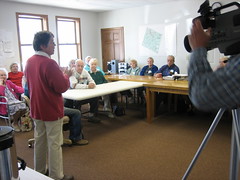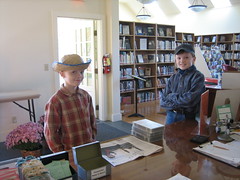This week at work I went back to one of the teeny libraries to help them get their three donated computers running. There is a local insurance company that upgraded and gave the library their old computers. For a library that has two computers total, including the one the librarian uses for all her work, this is a boon. Sort of.
I plugged in the computers and turned them on and was greeted with a Win2K registration screen of the “enter your product key” variety. I asked the librarian if the computers came with software and she said “just what’s on them.” You may have read about this part in last week’s post. I asked the librarian to call her friend and see about the product codes and we’d try again. I work at this library about 90-120 minutes a week. This week I showed up and the librarian said that her friend has said the product key was on the side on a sticker. “Doh!” Sure enough, there were 25 characters and I dutifully typed them in. No go. Turns out the sticker on the side of the machine is a Win98 product code and somehow, mysteriously, these computers have Win2k Pro installed on them. No one knows how. I ran down the options with the librarian. 1) Buy an XP license or three from Tech Soup. 2) Hassle her friend to figure out wtf is up with the software on these computers. 3) Wipe the drives and install Ubuntu.
I’m pushing for #3 and the librarian just doesn’t want to do #2. My friend on IM is pushing for a fourth option, a Linux thin client solution where all the machines run off a central server. It’s an appealing idea but I’m not sure if I can even explain it in a way that makes it sound like less of a risk than a life rich with Windows nonsense. So, we start with #3 and figure we have #1 as a backup. I start downloading Ubuntu and it’s going to take two hours, minimum. My class starts in four hours and it’s an hour away, so this project is going to take at least one more week to accomplish. While I’m futzing with the computers I notice that one of them doesn’t seem to be running the monitor correctly, or not at all. I do a bit of brief troubleshooting and determine that both monitors work but only one CPU seems to work to run the monitor. I look in the back of the computer and notice the vent fan is pointed sideways. I have no idea what to make of this. I do know that if we want to get rid of this computer in any sort of approved way it will cost us money.
Meanwhile we’ve bought 50′ of ethernet cable to wire up the computers in the basement (we’ll pay the electrician to drill the hole in the floor and run the cable), cadged a donated switch from a friend, bought three surge protectors and carried three computers and monitors down a narrow flight of stairs. I spend the last 30 minutes of my time there uninstalling IM clients — well not uninstalling them but setting them not to autorun on boot and not autologin when they start. The librarian was getting a bunch of messages for studman1234 when she started her day. She’s a practical gal, but everyone’s got their limits. I didn’t have time to run Windows Update or do any defragging.
I told this story to a local friend of mine who said “Geez, you can buy a new Dell for less than a thousand bucks, what a headache all of that is.” I had to explain to my friend that the library runs on a budget of less than 20K so a thousand dollar computer (and I think it’s more like $500 now) is not really in their universe for now. I’m sure there are well-meaning people who would love to help the library out, but it’s tough to find the time to sit down and compose thoughful and considered letters to them when you’re open 18 hours a week.
So, I don’t want this to be an entire “looking the gift horse in the mouth” post, but mostly I wanted to highlight that there is a range of costs associated with “free.” Most libraries I know don’t even want to take tech donations because they’re concerned that just this sort of thing will happen. On the other hand most of them are running Gates Foudation hardware from several years ago and they’re thinking about upgrades and considering their library’s future technological directions. Meanwhile I bought an old IBM X31 Thinkpad from ebay and I’ve been messing with it in the evenings to get it running the way I like it with an open source OS and software. It cost less than $300, but that’s only really a bargain if I don’t count the cost of my time. Since it’s a hobby project for me, I don’t, but when I’m on the clock it’s nice if things don’t take forever.

